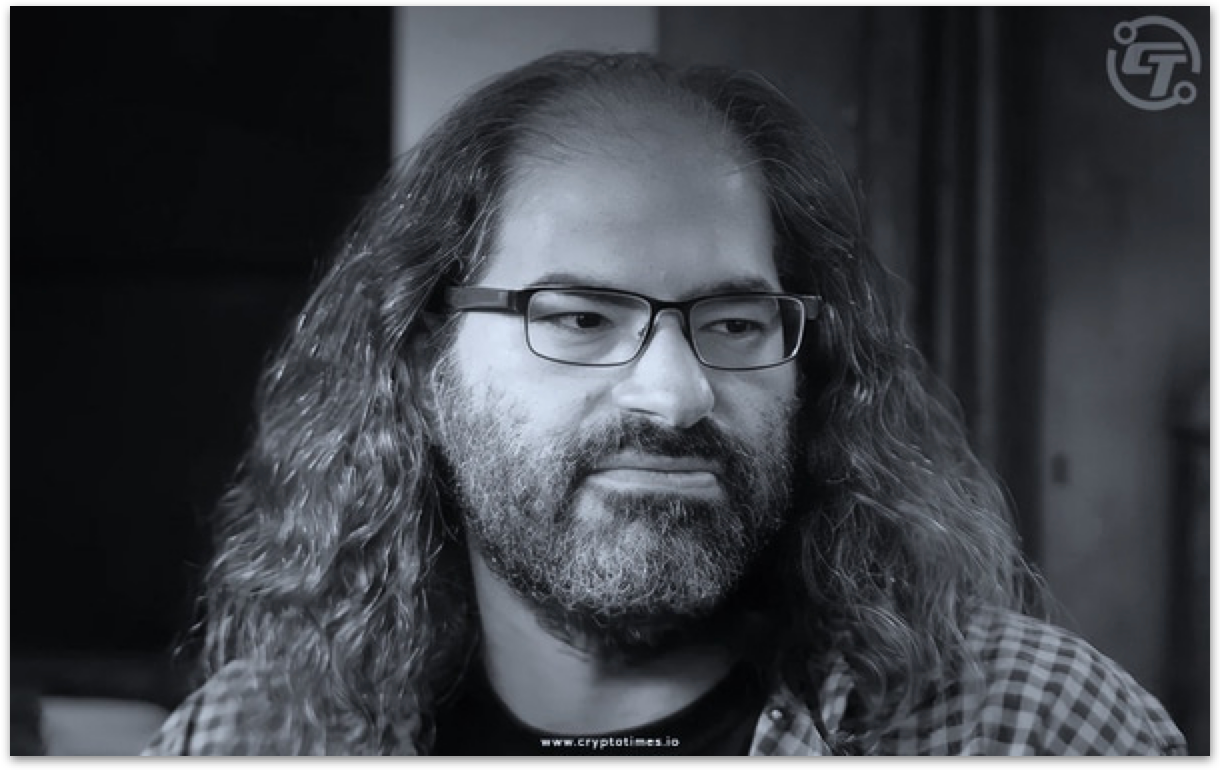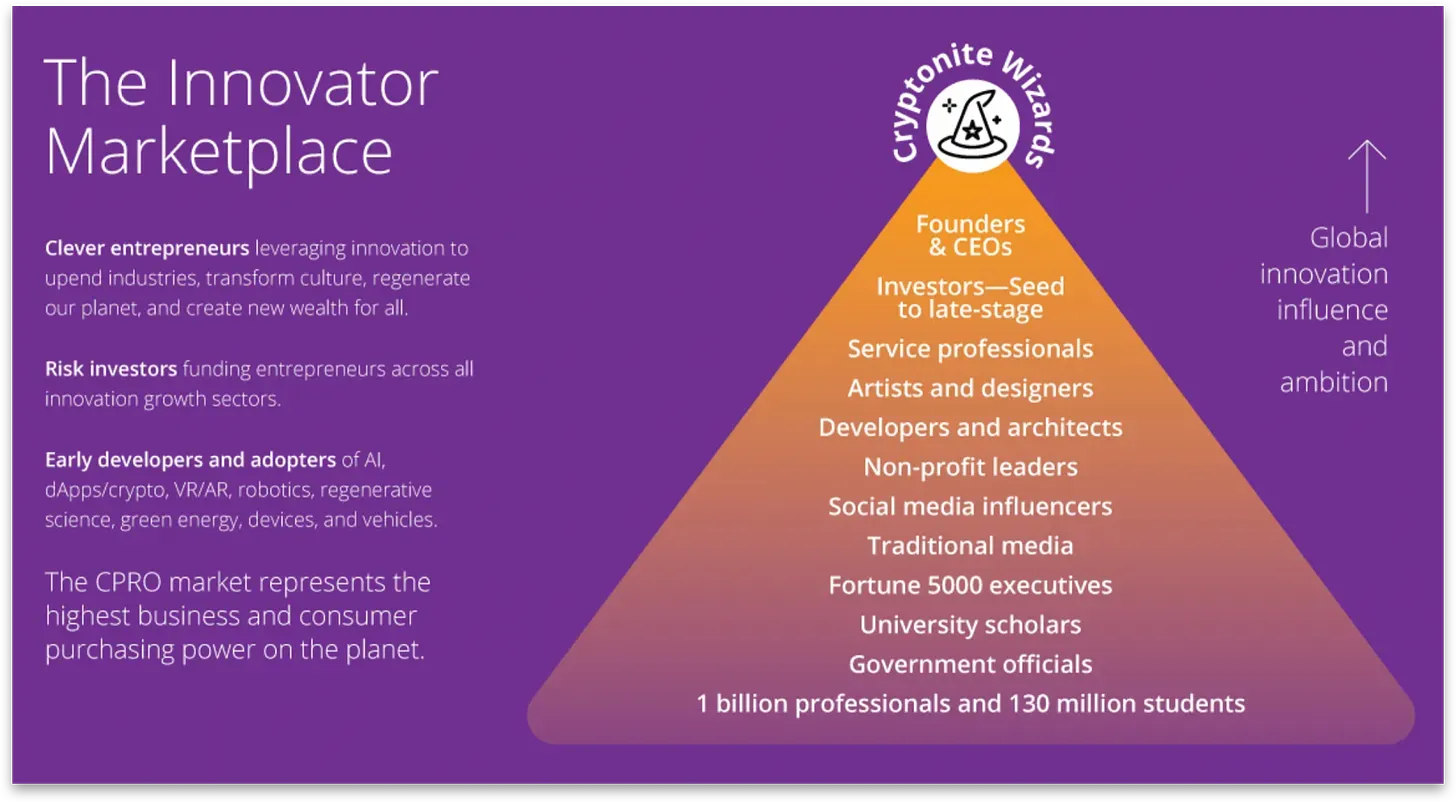
Our prognostications for a solid 2024
Bitcoin and stablecoins will break all-time highs—Solana and Ethereum move up.
In November 2021, Bitcoin, along with the altcoin market at large and NASDAQ, hit historic highs, then everyone had a horrible 2022. There is a variety of interlocking reasons that the Grand Daddy of Crypto—Bitcoin—will have a good 2024.
Bitcoin showed its market resilience by rebounding gallantly in 2023, after a brutal down market, plus the FTX circus, etc., and ended up largely outperforming most of Big Tech. Wall Street’s growing confidence in Bitcoin as a mainstream instrument in traditional finance (more on this below) will invariably improve market stability and help curb volatility. We will also stick out our necks and say the relationship between the government and Crypto Heads will also improve.

Apple (AAPL), NVIDIA (NVDA), Coinbase (COIN), Block (SQ)
If we bet on four tech stocks for 2024, it would be these four. Apple is set to introduce its Vision PRO goggles in February (see below) and close the year with some of the most glorious AI-enhanced features on earth throughout its pristine product line of devices and services. NVIDIA will benefit from GPU shortages and rising tensions with China (also see below) and maintain its dominance in AI chips. Coinbase (the second biggest crypto exchange in the world) and Block (Bitcoin represented 43% of Block's revenue) will both rise nicely with Bitcoin.
The Apple Vision Pro era begins—while Facebook’s creep glasses and low-brow Quest goggles flop
The Apple Vision Pro goggles and the birth of everyday spacial computing will delight early adopters, who will spend less time on their iPhones and laptops and feel better mentally and physically. We are believers in the long-term market power and ultimate cultural influence of Vision Pro. Handling work and personal apps hand and finger-free, immersive viewing of entertainment and educational experiences, your private videos, and those on the phone are dramatic enhancements to our lives.

The launch of the iPhone in 2007 set the smartphone standard we still live with today. In the same way, the Apple Vision Pro will set the new immersive experience standard for many years to come without any apparent competition in sight. Coincidently, Apple was granted a head-mounted display [HDM] patent in 2007, the same year they introduced the iPhone. Apple will win this category because they have been developing the Vision Pro carefully and meticulously for over 15 years. Goodluck Zuck.
Tradable NFTs will make a comeback, too!
Yes—believe it or not—monthly NFT trading volumes will hit a new all-time high in 2024 as seasoned speculators return and take positions in high-quality second-generation NFT collections on Ethereum and, increasingly, as Ordinals or Bitcoin NFTs on the base Bitcoin blockchain, as the green bar above shows below.

Part of our bullish view is based on our bet that crypto games and new Web3 social networks will reinvent the social experience by offering reward and loyalty NFTs (e.g., Blackbird), profile badges and distinctions, and trading cards— all of which would be tradable as part of the greater DeFi ecosystem. By the end of 2024, gaming and socialFi will be the primary drivers of NFT activity.
The romance between Wall Street and blockchain becomes official
Institutional adoption has accelerated. Traditional finance titans like BlackRock, Charles Schwab, Fidelity Digital Assets, and Citadel Securities have joined hands with Web3 upstarts like Bitwise to evangelize the approval of spot Bitcoin ETFs—which we predict will happen in 2024. A legit Bitcoin ETF will open the floodgates for billions of dollars worth of institutional assets to flow into the market.
On the back end, the Big Banks and mega-money managers are recognizing the transformative potential of blockchain technology. Tokenization of real-world assets via smart contracts, which has the power to make transactions more efficient and secure for their clients. JPMorgan’s Onyx Digital Assets platform, for instance, facilitates the creation of tokenized representations of traditional assets, enhancing efficiency through instant, secure transaction settlements at a fraction of the cost.
The tokenization of assets rate will accelerate.
The value of tokenized assets across all public blockchains reached $120 billion this year. Citigroup forecasts that tokenized real-world assets (RWA) will total $5 trillion by 2030, including diverse assets like stocks, bonds, ETFs or commodities, corporate debt, real estate, vehicles and boats, and precious metals. An additional $5 trillion could circulate into burgeoning digital currencies, most of which have yet to launch. We see Citigroup's numbers as low, and the $16 trillion number projected by BCG illustrated in the chart above will be closer to the mark.
This asset-based token portfolio trend is a big deal. It will drive crypto wallet penetration from roughly 22% of US adults (46 million people) today to above 80% over the next five years, which can only be good for the demand for Bitcoin and the other top altcoins.
Government and Crypto will find a middle-ground
The US court system handed the crypto industry two significant victories in 2023. Ripple’s native token XRP was ruled not to be a security, and Grayscale won in their lawsuit against the SEC regarding their Bitcoin ETF application – a few indications that a favorable regulatory landscape for blockchain in the US can be achieved, enabling further innovation to occur onshore. As we noted above, we do believe spot Bitcoin ETFs will be approved this year, and Coinbase has proven you can build a legit US-based crypto exchange, so we see better cooperation in 2024.
"By 2024 and beyond, the advancement of blockchain interoperability protocols will mark a major shift by breaking down the existing silos between different blockchains. This shift will enable diverse blockchain platforms to seamlessly interact by sharing data and value transfer, creating a unified and more efficient blockchain ecosystem. The role of interoperability protocols will be crucial in this transformation, as they will increase innovation, as well as foster new applications and use cases, specifically in DeFi."
AI-powered blockchain dApps will take on cloud computing
Now that the DeFi (Decentralized Finance) model has passed some strict tests with the highly regulated global financial institutions, the blockchain virus is spreading to every nick and corner of the enterprise app market. Defi’s programmability allows developers to create financial tools and smart contracts that can replace intermediaries, streamline operations, and cut costs across all industries. 2024 is the year of on-chain AI systems that will boost dApp application value exponentially.

The list of emerging ‘Fi’ sector opportunities bantered around Web3 parties has become hilariously long, including FanFi (fan management), GameFi (game finance and reward), IndFi (industrial design and process), MediaFi (decentralized multimedia production), RegFi (decentralized governance), and SocialFi (decentralized social media).
2024 will be the year when GameFi will help game companies create thriving secondary markets for NFT-based virtual goods and services, and SocialFi will allow a new generation of social networks to provide Web3 user verification, proof-of-ownership mechanisms, and blockchain reward and payment systems. In the SocialFi pace, we are following Base L2-based friend.tech, which tokenizes social experiences so you can buy and sell fractionalized “shares” of X accounts. Lens and Farcaster appear to be the leading Web3-native fusing DeFi with social networks.
Perhaps boldly, we predict that many cloud-based computing apps will be viewed as old-fashioned and mistrusted, and the first birth pangs of the coming cloud company consolidation will begin to be felt in the public markets by the end of 2024.
An AI startup shakeout will ensue in 2024
We could cut this story in a variety of ways, but Tim Cook gets to the bottom line below: AI is a fundamental technology, not a feature or product (or company.) The VCs are rightly betting—which they have in a BIG way—that AI innovation, like the Internet, will eventually be interwoven throughout the emerging computing paradigm (as will crypto and blockchain, in our opinion).
The question is whether the VCs have the self-awareness to separate their enthusiasm for ‘AI companies’ from those that have a well-defined, addressable market whose urgent problems they can solve.
“If you’re an Apple customer today, AI is in all of the products that we produce. If you’re composing a message or an email on the phone, you’ll see predictive typing, which tries to predict your next word so that you can quickly choose the word. That’s AI. When we recently shipped iOS 17, it had features like personal voice and live voicemail. AI is at the heart of these features. We view AI and machine learning as fundamental technologies, and they’re integral to virtually every product that we ship, not the feature or product.’
—Tim Cook, CEO, Apple

As with all significant innovations (cars, TV, Internet), we have overfunded the 'generative AI boom' to the delight of the entrepreneurs but the potential dismay of many early investors. Any of the current stable of generative AI startups that have not received new funding in the last 18 months will most likely struggle. Me-too companies building apps on top of OpenAI also face platform risks. Our gut says OpenAI will stumble again—and eventually be bought by Microsoft, which already owns 50 percent of the company, and surrender its innovation lead.
In fact, due to the expensive nature of the AI beast, we are also wondering if the incumbents, Microsoft, Google, Amazon, and the other server farm monsters, will end up gobbling up all the first-generation AI companies they have invested in. We speculate so.
After many of the VCs have lost their money, second-generation AI companies focused on genomics, climate, space, autonomous vehicles and robots, industrial design, and process apps will become very interesting. AI's move to open-source models and the standardization of Multimodal AI systems will help further spur innovation.
Multimodal AI systems train with and use video, audio, speech, images, text, and a range of traditional numerical data sets. Most importantly, multimodal AI means numerous data types are used in tandem to help AI better interpret content and context, something missing in earlier AI.
Tensions between US and CCP will rise over Taiwan
Our greatest geopolitical concern is the looming showdown between the CCP and the US over Taiwan, a state further exasperated by the GPU shortage currently ravaging the startup and Big Tech ecosystem. While these cutting-edge technologies come from the US, UK, the Netherlands, South Korea, and Japan—with 90 percent designed by Nvidia, Apple, Qualcomm, and Broadcom—they are made at the sprawling TSMC factory campus on the Taiwanese island that China claims as its own. The biggest buyers are Microsoft, Google, Amazon, Facebook, and many sovereign nations, with growing restrictions on what they can sell to China.
In essence, we are in this dance with Taiwan to do business yet deprive China of the world’s most advanced chips and equipment to make them.

The root of the problem is the fact that Washington's 'One China Policy' differs from Beijing's 'One China Principle'. The CCP principle holds that Taiwan is its sovereign territory, while the US policy is to acknowledge China's position but does not take a firm stance on the matter—kind of a don't ask, don't tell approach to diplomacy.
The One China principle is the position held by the People's Republic of China (PRC) and the ruling Chinese Communist Party (CCP) that there is only one sovereign state under the name China, with the PRC serving as the sole legitimate government of that China, and Taiwan is an inalienable part of China.
With the absence of diplomatic recognition, the US relations with Taiwan are guided by the Taiwan Relations Act by the US Congress for the continuation of Taiwan-US relations after 1979.
On January 13, Taiwanese voters will participate in the island's elections. To tamper down any Taiwanese aspirations of independence, CCP leader Xi has been increasingly vocal. "All Chinese on both sides of the Taiwan Strait should be bound by a common sense of purpose and share in the glory of the rejuvenation of the Chinese nation," Xi said during his year-end address on Sunday. 'The complete reunification of the motherland is an irresistible trend,' says the dictator.
Our diplomatic confusion, in addition to advanced chip backlog issues and government fears and retaliations, will be all over the news, and the situation may well get a bit unsettling.

Hollywood will consolidate, shrink, and move to a talent-to-fan model
In retrospect, the Hollywood strikes of 2023 were just the inner groans and despair that Hollywood will never be the same. While 'Content will always be King,' the original content creators and producers are gaining more financial, marketing, and distribution power, and the roles of Studios are diminishing and groping for new revenue models.
Entertainment insiders anticipate the studio herd to continue its dramatic contraction, leaving three or four studio platforms, and everybody else gets snapped up. There will be Apple, Amazon, Netflix, and one other. If NBCUniversal, Warners, and Paramount combined, as is being speculated, they would have enough gravitas to be the other player in the mix.

As entertainment moves towards a more direct talent/production-to-fan model, in-betweeners will no longer be needed. NFTs are changing how projects are financed and merchandized, how fans are involved, and how artists collaborate. Why wouldn't Taylor Swift sell her fans a stake in her next album or movie by selling them a multimedia-enhanced NFT, with all sorts of privileges and a little upside as well? There is also a burgeoning Film3 movement, started by Jordan Bayne, preaching the NFT gospel to the underrepresented, and Francis Ford Coppola's son Roman, who founded a Web3 studio, Decentralized Studios, for independent filmmakers.
And yes, there will be AI actors and extras, but AI will not write the next great film script or comedy series in 2024. We will be tracking how Vision PRO impacts entertainment devices and venue businesses.
The decentralization of education as we know it begins
In 2023, the top schools, with the Ivy Leagues in particular, have experienced leadership crises and are ranked as the most intolerant institutions in America. A mere third of college graduates younger than 50 say their college experience was useful in helping them develop skills and knowledge they could parlay into the workplace. People in the US owe $1.78 trillion in federal and private student loan debt. This madness has only led to creating a depression epidemic and drugging our children to keep them flying on the hamster wheel.
2024 will be the year that a visible group of parents and students won’t feel shy or ashamed about challenging the worth of the four-year, mass-produced curriculum ‘college degree’ racket and develop a more personalized, passion-driven approach to educating themselves. AI apps will begin to help us reinvent the way we gain knowledge, educate ourselves, and develop marketable skills at a fraction of the cost. Students will maintain life-long blockchain-based ‘transcripts’ to validate a variety of educational experiences for potential employers. The need for centralized education systems will fade away.

The Fentanyl overdose death spiral will continue
Until we start treating the addicted as people in need rather than criminals and are willing to offer them a safe space away from the cities—and get them high—we will live with Cartels, gangs, and deteriorating and unsafe cities. We are very passionate about this subject because it can be fixed.
Biden will drop out—Trump wins and pardons both himself and Joe
We have no dawg (nor much interest) in this race; we are just looking at the math and trends we see in people's attitudes—so please don't shoot the messenger 🤠. The bottom line is the so-called Democratic Party is losing its traditional support with young people, Blacks, and Hispanics according to recent polls and surveys, and is perceived as more elite and out-of-touch. The so-called Republican Party has become a more blue-collar party.
Our observation is that the new generation's contemptuousness for central power will mean political opinion will be more of an individualistic exercise rather than group (political party) think. This is a healthier trend and will lead to a less divided political atmosphere (we hope;)
Donald Trump received 12 percent of the Black vote in 2020, which was up from 8 percent in 2016. A GenForward, University of Chicago-related survey in November found that 17% of the Black voters surveyed would vote for Trump. A separate survey conducted in October by The New York Times found that 22 percent of Black voters in crucial swing states (Arizona, Georgia, Michigan, Nevada, Pennsylvania, and Wisconsin) would back Trump.
Donald Trump received 32 percent of the Hispanic vote in 2020, which was up from 28 percent in 2016. The CNBC All-America Economic Survey released Tuesday found that in a hypothetical head-to-head matchup, Trump had a 5-point lead with Latino voters against Biden, a reversal of the 7-point lead over Trump among Latino voters Biden enjoyed in the same poll last October.
The rise in the youth support for Trump has been the most dramatic. According to a recent NBC poll, 42% of voters 18-34 support Biden, with Trump ahead at 46%; a baffling turnaround since an exit poll from NBC News after the 2020 election that found Biden more than 20 points ahead of Trump within the same demographic.
Finally, for those into the betting odds, as you can see below, Trump is way ahead for 2024 with the high rollers, and they got Joe right in 2020. But in 2016, they were way off, with 88% betting on HRK over Trump.
As noted in the headline, we are betting Uncle Joe does not make it to the finish line, so an apparent wild card would then be the Democratic candidate. Right now, it appears the Democratic machine is positioning Gavin Newsome for the hand-off, which we (as life-long Californians) would advise is not a winning choice. People continue to leave California—818,000 people left California in 2021 and 2022, and another 340,000 escaped the 31st State in 2023—we will leave it as that. The other wildcard is the third-party candidacy of Robert F. Kennedy Jr., who garnered 10% of the vote in a recent poll. So far, the addition of RFK, Jr. only looks to help Trump.
And yes, we predict Trump will pardon himself (as a martyr) and Uncle Joe (out of the kindness of his heart ❤️) just before the nooses get pulled around their presidential necks.
Epilogue
Global Silicon Valley entrepreneurs are building a new AI-powered, decentralized computing paradigm where online creators (i.e., all of us) will eventually own and control our content to browse, delete, download, or share at will. A vast new generation of Web3 dApps is emerging, and the migration away from the Big Tech, cloud-based apps that invade our privacy, turn our data over to governments, and trade us like commodities on the ‘attention-span exchange’ is in full swing. This transition will be a $200 trillion economic boom that will bring unbanked regions online, put the final spike in the back of poverty, and free us from the centralized powers who have lost our faith.
“The decentralized future is not just about creating new applications; it’s about rethinking how we organize society. You shouldn’t have to trust any single person, institution, or centralized organization to transact and get things done.”
—Vitalik Buterin, Co-founder and developer of Ethereum
During this chapter, all current Political Party structures and their slogans, labels, and insulting stereotypes will fade away—It is already happening. The new dividing lines will be between the institutionalists, who want to hold on to centralized power because they know better for us than we know for ourselves (and want to keep their jobs), and those who wish to live private and free lives, as Vitalik says, without having to trust any institution or person. Part of this move away from centralized power is also a move away from the US engaging in and funding conventional wars, which have proven neither popular nor just. For these things, we pray.
Overall, we are supremely inspired by how many areas in society are trending to more individual and localized control ✊🏼😎. Feliz año nuevo para ustedes y sus familias!
Join us at Silicon Valley ‘24
We wanted our cherished members to be the first to know that Cryptonite will be producing the first Voting Block USA annual gathering this Summer called Silicon Valley ‘24. The exact dates and location will be announced soon after all is confirmed.
The purpose of Silicon Valley ‘24 is to bring together top Web3 entrepreneurs and investors with public policy thought-leaders to discuss and debate top global economic and regulatory trends and how they might intersect with Web3 innovation to create a more private, secure, efficient, and prosperous life for all.
Working together for a better world
“I don’t think everybody in DC actually fully realizes how powerful the crypto voting community block is. 56 million people in the US have already used cryptocurrencies. That’s 5x as many people that have an electric vehicle. The 2024 election is our time to hold candidates’ feet to the fire and say, What is your position on the possibilities of blockchain and crypto?”
—Brian Armstrong, Founder & CEO, Coinbase
Voting Block USA (VB USA) is a non-partisan, non-profit, grassroots project dedicated to educating the public on how Web3 innovation (including blockchain, AI, crypto, and metaverse) can help create a more private, secure, and efficient private and public sector.






















